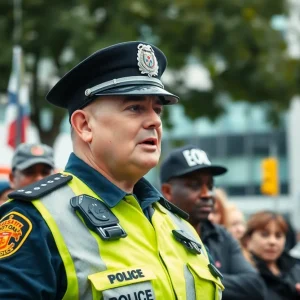10 Years of Marriage Equality in Asheville: A Photo Exhibit Celebrates a Historic Day
ASHEVILLE – Wives Elizabeth Eve and Kathryn “KC” Cartledge beamed at each other June 12, standing outside a downtown government building, a pride flag draped from its second-story window. They’ve been together for 42 years and were there to “relive” the moment a decade before, waiting in that same government office, when they learned gay marriage was legally recognized in North Carolina.
Inside the building, visitors packed a narrow hall in the Buncombe County’s Register of Deeds office, where a photo installation celebrated the days that led up to — and the immediate aftermath of — the 2014 ruling by a federal judge in Asheville that struck down the state’s ban on gay marriage. Many of the people in the exhibit at its June opening had helped lead the fight 10 years ago, like Eve and Cartledge, who even now can’t stop smiling when they talk about it.
The ‘Epicenter’
Allison Scott, director of impact and innovation with the Campaign for Southern Equality, called the office the “epicenter” of the defeat of Amendment One, the 2012 state constitutional amendment that prohibited same-sex marriage in North Carolina. In 2014, the office was on Woodfin Street, a block away from its current location. It neighbored the First Congregational United Church of Christ in Asheville, whose pastor was a plaintiff in the federal case filed in the Western District of North Carolina that led the historic ruling, along with other clergy and LGBTQ+ couples.
Among the defendants was Buncombe County Registrar Drew Reisinger. He was fiercely supportive of marriage equality, and worked closely with the plaintiffs in the case to secure victory, but he and his staff were barred from issuing licenses under North Carolina law. The defeat of the ban happened, Scott said, “because people like Drew and others knew the right thing to do, even when they were being told legally they couldn’t.”
Day of the Ruling
Joe Hoffman, in 2014 a pastor at First Congregational UCC, now retired, smiled to see a photo of himself in the exhibit, embracing a couple whose wedding he had just officiated in the Registrar’s office. “See that happiness?” he said. He had been a part of the advocacy work in the years preceding the ruling and refused to officiate heterosexual marriages until everyone in his congregation had the right. The day of the ruling, he was among those waiting for news to break.
An announcement days before by the U.S. Supreme Court, that it would not hear any appeal of a July ruling by the 4th Circuit Court of Appeals in Richmond striking down Virginia’s ban, paved the way for states to move forward, but it wasn’t clear how or when, Beach-Ferrara said.
Wins Can Happen
While marriage can be a symbolic gesture, activists will note it is much more than that — it also represents a range of financial and legal implications, such as filing taxes jointly, health care privileges, and Social Security and inheritance benefits. Nearly 1,200 federal protections and rights are triggered by marriage, Beach-Ferrara said. “There is no way to approximate those.”
Even a decade later, the future can feel uncertain. Immediately after the Supreme Court overturned Roe v. Wade in June 2022, the Register of Deeds office saw a significant increase in same-sex couples seeking marriage licenses. The language of the decision itself and Justice Clarence Thomas’ concurring opinion, which called for the court to reexamine other landmark cases, including the 2015 Obergefell v. Hodges decision that guaranteed marriage equality, sent an undercurrent of fear rippling through the community.






